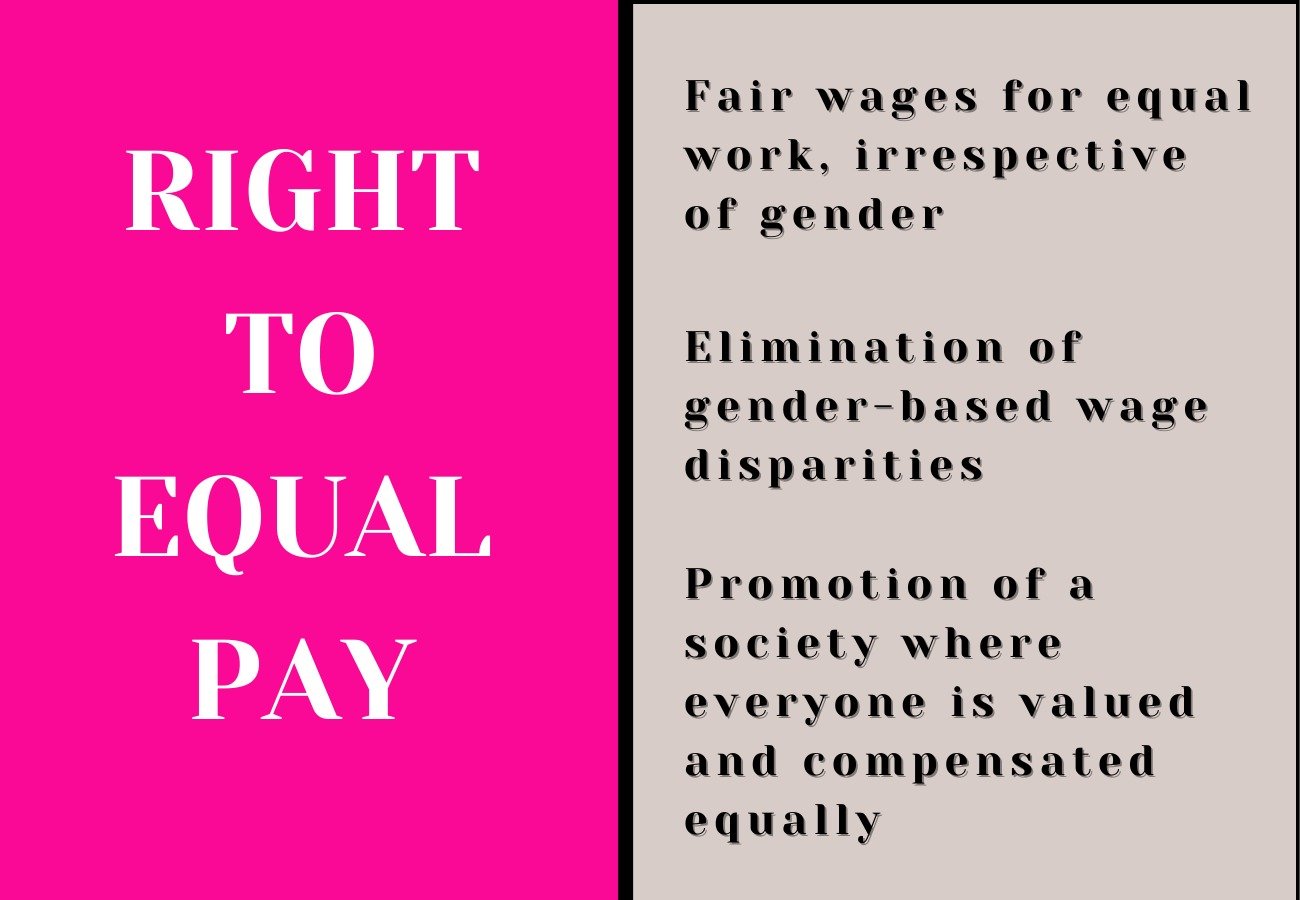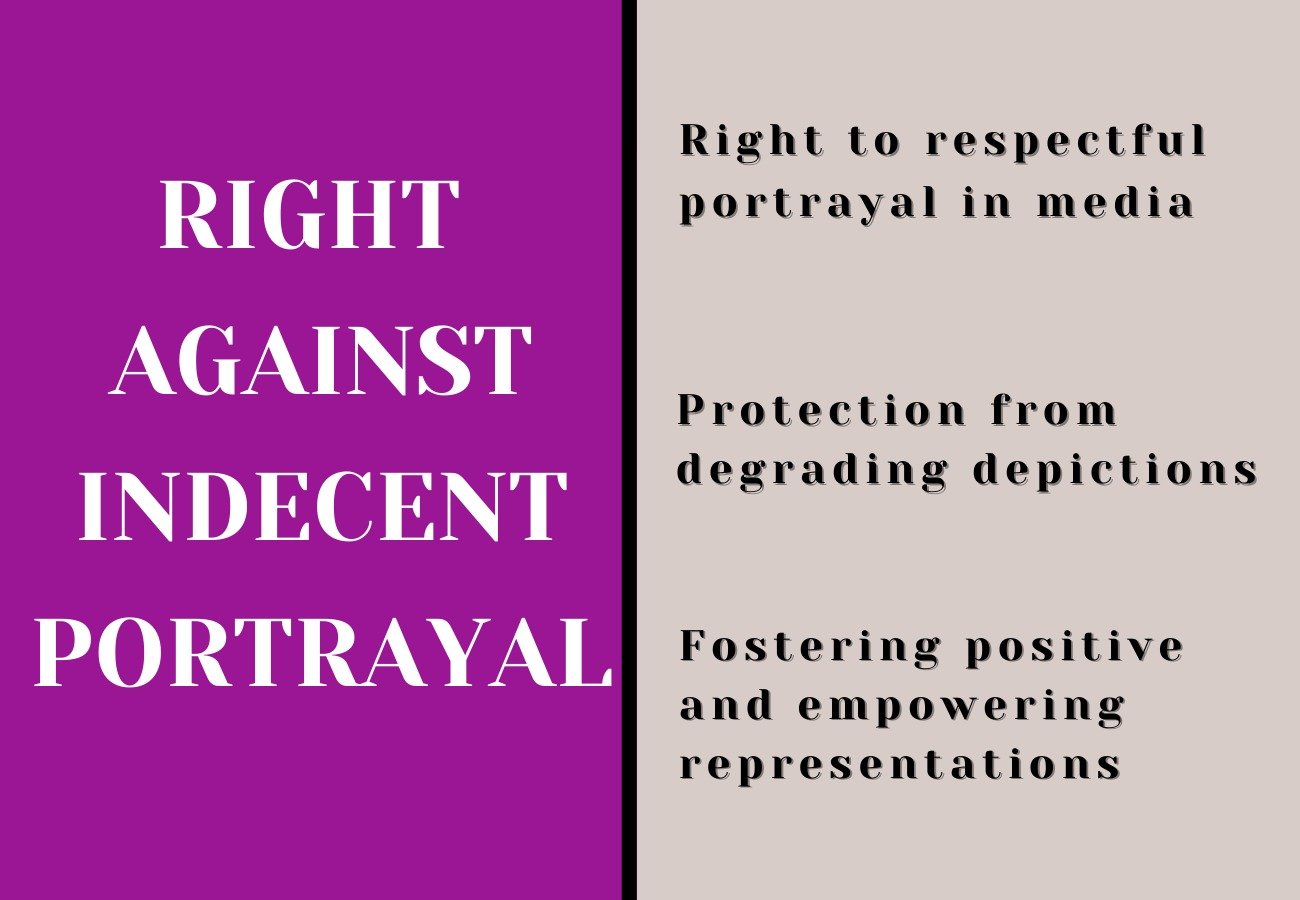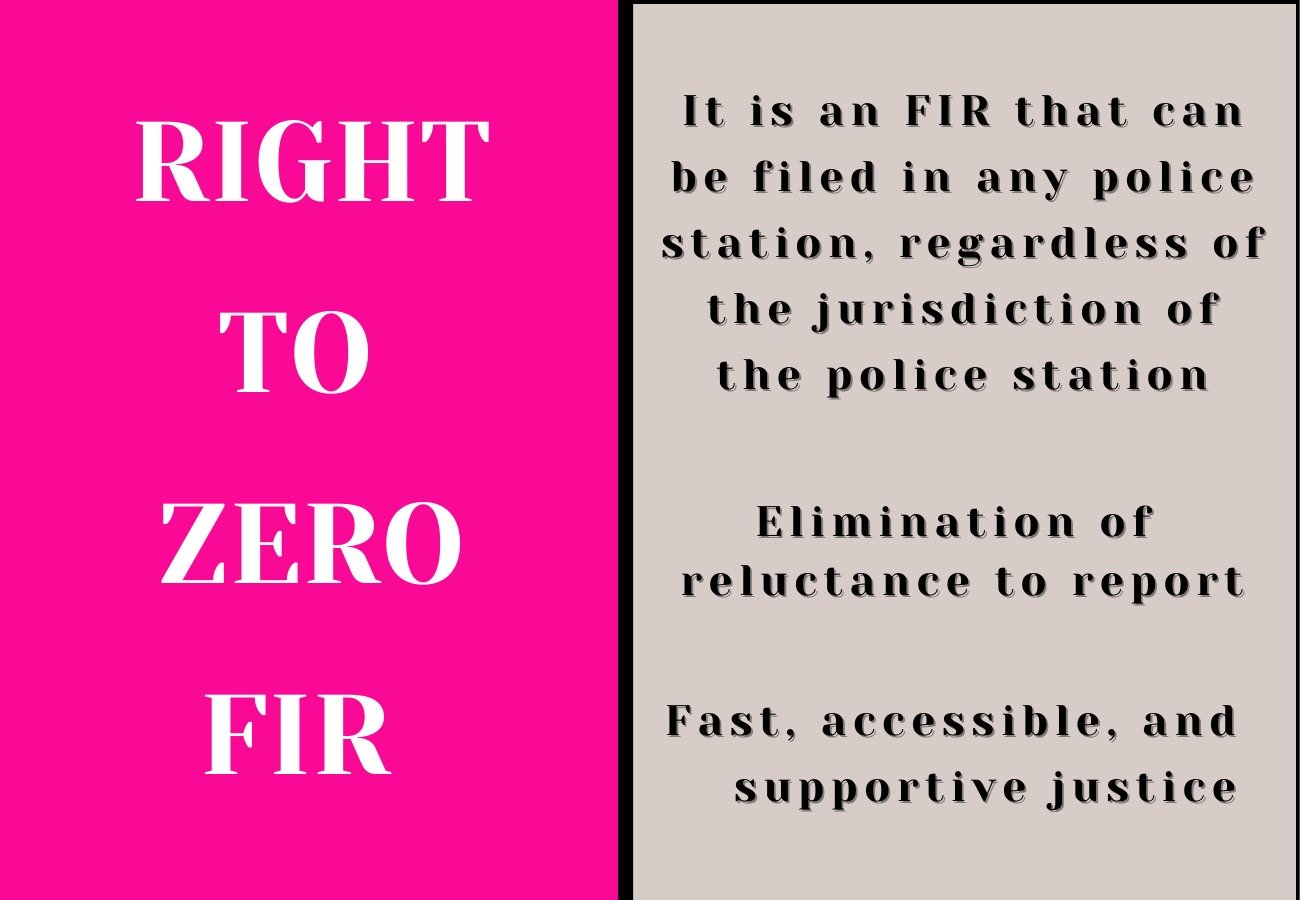


Women have the right to be paid the same as men for doing the same job. This means everyone should earn fair wages based on their work, not if they are a man or woman. It's about fairness at work, making sure everyone is treated the same. This right fights against unfair differences in pay because of gender, creating a society where everyone, no matter their gender, is valued and paid equally for their efforts. It's an important rule to make sure workplaces are fair, giving everyone the same chance to earn a living wage.
.jpeg)
Every woman has the right to be treated with kindness and respect. This means no mean words or actions, creating a culture of fairness and mutual respect. Upholding this right is crucial for building a society where women feel secure, respected, and valued, promoting personal and professional growth. It goes beyond rules; it's about making a culture that is fair, kind, and respectful to everyone, creating an environment where women can navigate life with confidence and a sense of self-worth.
.jpeg)
Women have the right to work in places free from harassment. This means no unfair treatment, intimidation, or bad behavior at work. It's about creating a workspace where women can do their jobs without feeling uncomfortable or facing obstacles because of their gender. Upholding this right helps in making workplaces that are fair, respectful, and supportive for everyone, ensuring that women can contribute freely without compromising their well-being or facing barriers rooted in gender bias.
.jpeg)
Every woman has the right to live at home without the fear of being hurt. This means no physical, emotional, or economic abuse, creating safe and nurturing homes. Upholding the right against domestic violence is essential for building a society that values family safety and supports women in leading happy lives without the trauma of violence at home.
.jpeg)
Every woman, no matter her money situation, should be able to get legal help. This ensures fairness and equality in the legal system, providing everyone with an equal chance to fight for their rights. It's about justice being accessible to all, irrespective of financial means, making sure that legal representation is not a privilege but a fundamental entitlement..
.jpeg)
Women should be safe from getting arrested during the night without a good reason. This is because nighttime can be risky, and this right ensures that women are treated with care and respect by the law. It's about balancing the need for safety with an individual's right to feel secure, creating an environment where women can go about their lives without the fear of untimely or unsafe arrests..
.jpeg)
Individuals found guilty of stalking may face penalties that can range from imprisonment for up to three years, a fine, or both. The severity of the punishment underscores the gravity of the offense and serves as a deterrent against this intimidating behavior.

Women deserve respectful portrayal in media, protected from degrading or exploitative depictions. This right aims to create an environment where women are not reduced to stereotypes, fostering positive and empowering representations. It underscores media responsibility in shaping public perceptions towards women, making sure that media shows women with dignity and respect.
In the online world, women have the right to complain about bad behavior promptly. This acknowledges the importance of a secure online space, encouraging reporting and contributing to deterrence of cybercrimes. This right reinforces the principle that safety and justice extend to the virtual realm, fostering a culture that values and safeguards individuals' well-being online.
Report to the Platform Hosting the Image Whether it's a social media site, website, forum, or Google, each has a mechanism to report such content:
Social Media (Facebook, Instagram, Twitter, etc.)
1. Go to the post/photo → Click “Report”
2. Select “Non-consensual intimate image”, “Harassment”, or “Inappropriate content”
3. Use their support form if available (especially for image-based abuse)
4. Facebook: Report Non-Consensual Intimate Image
5. Instagram: Report Abuse
6. Twitter/X: Report Non-consensual nudity
File a Complaint on the National Cyber Crime Portal (India)
2. Select “Report Women/Child Related Crime”
3. File an official complaint (anonymous option available)
4. Attach screenshots, URLs, date/time, and description
Benefits:
1. The National Cyber Crime Portal is Free to use
2. Fastest response for Indian citizens, especially for women-related crimes
3. Offers assistance in getting content removed from platforms
4. Leads to legal action + removal orders for websites
5. This can result in removal of content + legal action against the uploader.
You can request Google to remove such images from its search results:
1. Google Content Removal Request
2. Choose “Nude or sexually explicit content that was shared without my consent”
3. Fill the form and attach evidence
4. This doesn't delete the image from the host site, but removes it from search results, making it harder to find.
Contact the Website Directly
1. If the image is on an independent site or forum:
2. Look for “Contact Us”, “Report Abuse”, or DMCA takedown request
3. Send a formal removal request with a legal tone and evidence
File an FIR or Legal Complaint
1. Visit your nearest Cyber Crime Cell or Police Station
2. Laws applicable in India:
3. Section 66E, 67, 67A of the IT Act
4. IPC 354C (voyeurism), 509 (insulting modesty)
5. With a police complaint, you can legally force the site to remove content and prosecute the offender.
Seek Help from Cyber NGOs or Legal Support
1. Cyber Saathi – https://cybersaathi.org
2. Red Dot Foundation (Safecity)
3. Free Legal Aid Clinics – Law colleges or legal NGOs in your city
StopNCII.org (Trusted, Free, Global)
2. Helps remove non-consensual intimate images (NCII) shared online (including morphed photos)
3. Created by the Revenge Porn Helpline UK with global tech support (Meta, TikTok, Bumble, etc.)
4. Uses a secure digital fingerprinting system to identify and block the image from being uploaded again
5. Privacy focused: You don’t need to upload the image to the site
6. Supports: Facebook, Instagram, Reddit, TikTok, OnlyFans, and more
DMCA.com (Paid Service)
1. https://www.dmca.com/takedowns.aspx
2. Professional takedown service for copyright and personal privacy violations
3. You submit the image + URLs, and they send official legal takedown requests to websites and hosts
Benefits :
1. Has a reputation-based advantage, especially with global web hosts
2. Paid service, but they manage everything for you
Reputation Defender / NetReputation / Incogni (Paid, Professional Tools)
These companies specialize in removing negative or harmful content about individuals online:
1. https://www.reputationdefender.com
2. https://www.netreputation.com
Benefits :
1. Best for: High-profile cases or wide-spread content
2. Paid services (cost varies based on how much content is out there)
Google Removal Tools
1. https://support.google.com/websearch/troubleshooter/3111061
2. If your morphed photo appears in Google Search results
3. Google won’t delete the image from the host site, but will de-index it, making it harder to find
In a landmark judgment, the Supreme Court of India has declared maternity leave a constitutional right, safeguarded under Article 21 of the Constitution, which guarantees the right to life and personal liberty. This decision empowers women by ensuring they are entitled to maternity leave regardless of the number of children they have—extending protection even for a third child and beyond. The Court ruled that state-imposed restrictions are invalid if they contradict the Maternity Benefit Act, reaffirming that women's reproductive health, dignity, and workplace equality are fundamental rights, not privileges.

Survivors of sexual assault have the right to keep their names private. This protects them from judgment and harm, fostering an environment where survivors feel safe to report crimes and seek justice without fear of harm or discrimination. Upholding the right to anonymity in such cases contributes to breaking the silence around sexual violence, encouraging survivors to seek justice while maintaining their dignity and protecting them from potential harm or discrimination.
These sections of the Indian Penal Code are instrumental in protecting the rights, dignity, and safety of women in various contexts, from physical to digital spaces. They emphasize the importance of consent, respect, and personal boundaries, contributing to a more equitable and secure society for all.

Women reporting crimes should experience swift, serious action. This right ensures immediate acknowledgment and action, eliminating hesitation in reporting crimes. It reinforces the principle that justice should be fast, accessible, and supportive, prioritizing the safety and well-being of women and instills confidence in the judicial process.
The Right to Disconnect is an emerging labour policy that gives employees the legal right to not respond to work calls, messages, or emails after official working hours. It protects employees from an always-on work culture and ensures a healthier work-life balance.
How It Benefits Women
Women often shoulder dual responsibilities — professional work and unpaid household/caregiving work. This law directly supports them by:
1. Reducing Mental Load
2. Supporting Working Mothers
3. Encouraging Fair Work Culture
How Women Can Use This Law if a Boss Misuses Power
Important: It should be used for protection, not confrontation
Here’s how women can assert their rights professionally and safely
1. Respond Politely Using the Law - If the boss messages after work hours: “As per the Right to Disconnect guidelines, I will take this up during working hours tomorrow.” A polite reminder, not a conflict.
2. Keep Proof - If late-night messages or calls are frequent, women can:
This becomes evidence if the behaviour continues.
3. Request Written Clarification of Work Hours - Ask HR or the reporting officer: “Can you please clarify official working hours as per the Right to Disconnect policy?” This puts gentle pressure on the organisation to follow rules.
4. Report Extreme Cases - If the boss:
Women can raise it to HR - Internal Complaints Committee (for behaviour amounting to harassment) or to Labour authorities (if it becomes exploitation)
5. Use Team Language, Not Personal - Instead of saying “You disturb me”, say: “Our team should follow the Right to Disconnect policy for everyone."